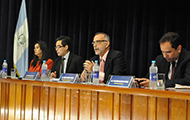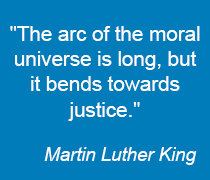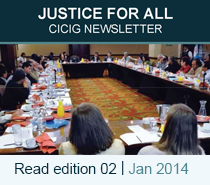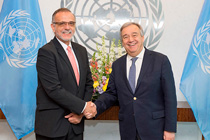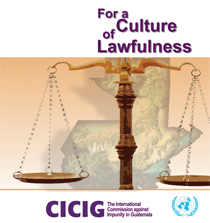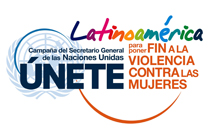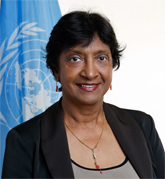 Guatemala, September 9, 2011. On September 8, Navi Pillay, United Nations High Commissioner for Human Rights, delivered a message to Guatemalans ahead of the general elections on September 11. The message addressed the need to take measures on security, impunity, discrimination and racism, poverty and malnutrition, violence against women, and fiscal reform to achieve genuine respect for fundamental human rights in the country.
Guatemala, September 9, 2011. On September 8, Navi Pillay, United Nations High Commissioner for Human Rights, delivered a message to Guatemalans ahead of the general elections on September 11. The message addressed the need to take measures on security, impunity, discrimination and racism, poverty and malnutrition, violence against women, and fiscal reform to achieve genuine respect for fundamental human rights in the country.
Pillay believes these issues are most urgent, but the road to overcoming them is complicated: "I am aware that Guatemalans are convinced, as I am, that the country's situation is reversible and a society can be built in which each individual enjoys all corresponding rights and freedoms and participates and benefits from the country's development."
Challenges
The challenges faced by Guatemalan authorities in order to achieve genuine respect for fundamental rights are:
- Security
- Impunity
- Discrimination and racism
- Poverty and malnutrition
- Violence against women
- Fiscal reform
She added that new authorities "will be responsible for addressing the country's structural problems and fulfilling the State's duty to guarantee and uphold human rights."
Among the problems faced by Guatemala, the most outstanding are the issues surrounding security and justice; the High Commissioner recommends strengthening the National Civil Police (PNC) and approving the pending laws on the matter, which have been approved by civil society, the International Commission against Impunity in Guatemala (CICIG) and the international community. Furthermore, there must be more controls over and a decrease in the number of arms through the introduction of a national disarmament plan, which would contribute to a reduction in criminal acts.
"Defeating past and present impunity is possible, as shown by the progress achieved through the effective coordination between the Public Prosecutor’s Office (MP) and the Ministry of the Interior, which has been supported by CICIG. It is important to maintain and protect these achievements, ensuring institutional continuity at the Public Prosecutor’s Office," she emphasized.
As regard to violence against women, she urged authorities to continue to promote the Law against Femicide and Other Forms of Violence against Women by strengthening and expanding specialized courts.
The UN official believes that new national and regional authorities will work to overcome these challenges and promote a priority agenda for human rights actions, because there is "an opportunity to make progress and strengthen the rule of law and democracy".
Respect for human rights
Respect for human rights is crucial for citizens of any country in the world, who value principles such as the search for dignity, freedom and equality for all.
Fundamental rights allow individuals to fully enjoy their humanness and have their dignity respected. The history of human rights stretches back to the 18th and 19th centuries, at which time, a series of events transpired highlighting the ideas of freedom and equality of human beings. These events contributed to the conceptualization of human rights.
The most valuable contribution came from the liberal ideas of the 1789 French Revolution: the Declaration of the Rights of Man and of the Citizen. The Declaration set forth the universal nature of human rights and man's ownership of such rights.
The aftermath of the Second World War contributed to the international community formally promoting these rights in declarations and international pacts such as the Universal Declaration of Human Rights, which was adopted and proclaimed by the United Nations General Assembly on December 10, 1948.
The Assembly subsequently requested that all Member States publish the text of the Declaration and that it be "distributed, circulated, read and discussed in schools and other teaching establishments."
Human Rights in Guatemala
In Guatemala, the first rights were established in 1809 in "Notes on Agriculture and Trade in the Kingdom of Guatemala". The first constitution—the Constitution of the Central American Federation—refers to the right to life, freedom, speech, equality before the law and freedom of movement.
On December 14, 1839, Mariano Rivera Paz authorized and published the Declaration of the Rights of the State and its Inhabitants. The norms of the Declaration include the free, sovereign and independent nature of the State of Guatemala. Moreover, it establishes that the Declaration was created to guarantee the right to life, honor and property.
In 1871, the rights to religious freedom, property and the sanctity of the home were added. The 1944 revolution included certain social rights for the first time, such as social security. Then, the rights to free association, freedom to join unions, the right to vote, to culture, to the environment, development and peace were declared.
Human rights can be split into four categories: civil and political rights; economic, social and cultural rights; collective rights; and rights of specific groups.
Guatemala has assumed a number of international commitments regarding fundamental rights. It became one of the first countries to ratify the Universal Declaration of Human Rights.
Furthermore, it has signed other similar treaties and agreements which are in force in the country:
- International Convention on the Eradication of all Forms of Racial Discrimination.
- International Convention on the Rights of the Child.
- International Convention against Torture and Other Cruel, Inhuman or Degrading Treatment or Punishment.
- International Convention on the Eradication of all Forms of Discrimination against Women.
- International Convention against the Protection of Rights of all Migration Workers and Members of their Families.
- ILO Convention 169 on the rights of indigenous and tribal peoples.
- Convention on the Prevention and Punishment of the Crime of Genocide.


